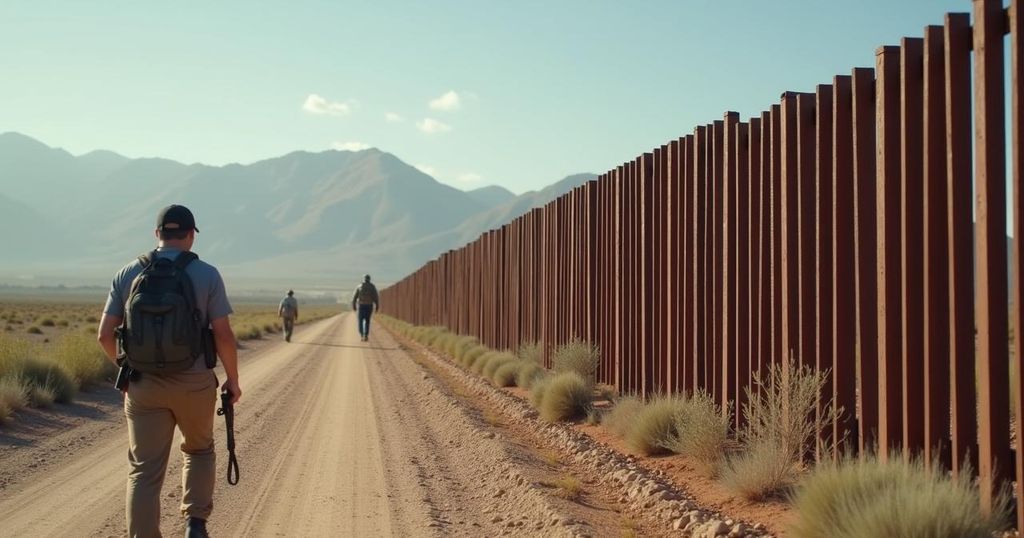Mexico’s Strategic Border Enforcement as U.S. Elections Approach

As the U.S. approaches the presidential election, Mexico has intensified its border enforcement, leading to a drop in migrant crossings from nearly 250,000 in December 2022 to 60,000 last month. This decrease is a product of informal negotiations with the Biden administration aimed at maintaining economic stability and minimizing border disruptions as political stakes rise. Amid heightened enforcement, many migrants, such as families fleeing Venezuela, face significant barriers in their journey to the U.S.
As the United States approaches the upcoming presidential election, Mexico has maintained stringent border enforcement measures that have resulted in a significant decline in migrant crossings. Analysts attribute this decrease to an informal yet impactful agreement between the two countries, largely influenced by the Biden-Harris administration’s negotiations initiated late last year. This partnership has been beneficial for Mexico, as it seeks to keep border disruptions to a minimum in order to facilitate economic stability and uphold trade relations with the U.S. In light of the electoral stakes, particularly concerning immigration, Mexican President Claudia Sheinbaum is acutely aware of her country’s role in influencing the political landscape of the election. The surge of migrants attempting to reach the U.S. has drastically decreased from nearly 250,000 encounters in December 2022 to approximately 60,000 last month, marking the lowest monthly figure since the prior administration. However, despite the significant reduction in illegal crossings, reports indicate that Mexico’s immigration authorities have intensified enforcement strategies, effectively impeding the progress of many migrants. Families such as the Sarmientos, who fled Venezuela, find themselves stranded in Mexico City after facing severe obstacles in their attempt to reach the United States. This shift in policy has evolved from a more lenient approach where migrants could obtain travel visas to one that creates formidable barriers for those seeking asylum or safe passage. Under this new system, migrants often face deportation and exhaustion from repeated cycles of enforced removals, hindering their aspirations for a better life. Moreover, diplomatic discussions between U.S. officials and Mexico have been characterized by a combination of incentives and pressures aimed at bolstering Mexican efforts in migration control. A critical factor in this equation is the economic dependency of Mexico on trade with the U.S., which was clearly demonstrated when the U.S. threatened to restrict commercial traffic at key border crossings. While the Biden administration has provided humanitarian assistance, it has not financially supported Mexico’s enforcement strategies. As enforcement measures continue to evolve, particularly under Sheinbaum’s administration, the future of U.S.-Mexico migration policies remains uncertain, intertwining economic interests with the growing complexities of political dynamics ahead of the elections.
The article discusses the intricate relationship between U.S. immigration policies and Mexico’s enforcement measures in light of the upcoming U.S. presidential election. It highlights the significant decrease in migrant crossings at the U.S. border, attributed to an informal agreement stemming from negotiations between the Biden administration and Mexican authorities. The political landscape of the U.S. has intensified discussions surrounding immigration, especially with Republican rhetoric framing it as a critical issue. In this context, the Mexican government is seen as holding considerable leverage to influence U.S. electoral outcomes through its migration policies.
In conclusion, the interplay between Mexico’s border enforcement strategies and the forthcoming U.S. election encapsulates the complexities of immigration as both a political and humanitarian issue. As illicit crossings have significantly dropped due to heightened enforcement, the implications for migrants continue to evolve, presenting substantial challenges for those seeking safe haven. The delicate balance of economic interests, political pressure, and humanitarian obligations will undoubtedly shape future U.S.-Mexico relations.
Original Source: www.usatoday.com







